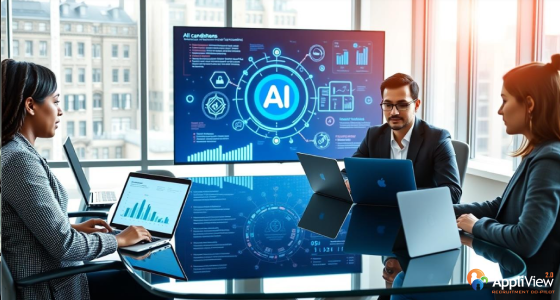Transforming Recruitment with AI: A Comprehensive Guide
December 13, 2024

Artificial Intelligence is revolutionizing recruitment by automating tasks like candidate sourcing, resume screening, and initial assessments. These tools expedite hiring, reduce costs, and enhance accuracy, yet human oversight remains essential. Combining AI’s analytical capabilities with human empathy creates a balanced approach that not only evaluates qualifications but also assesses vital soft skills.
Transforming Recruitment with AI: A Comprehensive Guide
The rise of Artificial Intelligence in recruitment marks a significant shift in how companies approach their hiring processes. By automating time-intensive tasks such as candidate sourcing and screening, AI enables HR professionals to focus on strategic decision-making and building relationships. At its core, AI in recruitment employs machine learning algorithms to parse resumes, match candidates to job descriptions, and predict potential job performance. This technology not only expedites the recruitment cycle but also increases accuracy by minimizing human error and bias—problems that remain critical in traditional hiring practices.
Smarter, Faster, Cheaper: The Role of AI in Modern Talent Acquisition

AI-powered tools are now capable of performing a range of functions that were once managed by humans alone. For instance, AI can analyze countless resumes in a fraction of the time it would take a human recruiter. With language processing abilities, these tools can categorize applications based on criteria set by an organization, making them efficient filters in the early stages of hiring. In addition, AI systems can conduct initial assessments through chatbot interviews or online tests that evaluate a candidate’s skills and aptitude. Not only do these tools reduce time-to-hire, but they also significantly cut down recruitment costs, allowing businesses to allocate resources more effectively.
Where AI Meets Empathy: The Future of Recruitment

Despite the advantages AI brings, human oversight remains a critical aspect of the recruitment process. AI can screen and rank candidates, yet it lacks the nuanced understanding of human interactions and subjective judgments that experienced HR professionals bring to the table. Therefore, an ideal recruitment strategy integrates AI’s analytical prowess with human intuition and empathy. This hybrid approach allows recruiters to not only select candidates based on qualifications but also assess emotional intelligence, adaptability, and other soft skills vital for success in the workplace.
Conclusion
AI is transforming the recruitment process by automating repetitive tasks, delivering advanced analytics, and improving the overall candidate experience. Despite these advancements, human judgment remains crucial to ensure that hiring practices are not only efficient but also empathetic and thoughtfully executed. Leveraging AI allows organizations to streamline their processes while preserving the human connection needed to create an engaging and meaningful candidate journey.
